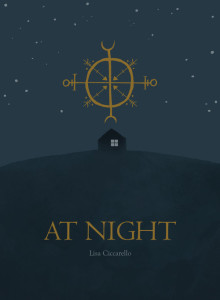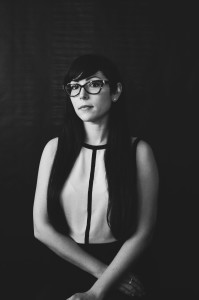 Book Title, Press, Year of Publication:
Book Title, Press, Year of Publication:
At Night, Black Ocean, 2015
Synopsis: The poems concern themselves with what happens at night.
What do you think makes your book (or any book) a “project book”?
I think there are many ways to approach the “project” aspect of a project book, but as far as my book goes, the poems adhere to very clear guidelines — they were all titled “At night,” the action in them takes place at night & I tried very hard not to give them an easily definable location or time — which makes their origins a little more considered.
Why this subject (or constraint)?
I love the danger & intimacy & imagination inherent in darkness. At first it started out as a kind of mini challenge (of the sort I give myself often) — just write about things that happen at night! — but I could see that I had plenty of interest in the possibilities there & kept on writing. As far as the timeless/placeless constraint, that tends to be a relatively consistent personal preference, in that I’d rather not mention things that weren’t around in, say, 1880. I like to leave those parts undefined because I don’t think they’re essential to what’s going on in the poems.
How important was it for you that each poem could “stand on its own” or that the poems should rely on other poems in the book, or on the premise of the project itself, to succeed? What challenges did this present for you when writing single poems or structuring the book overall?
It was very important to me that the majority of the poems would stand alone. I don’t like to make something that feels inherently incomplete. I think they can be better when read in groups, in that they tell a more complete story or the fear & desire in the individual poems congeals into something even more compelling. I like to think that the pieces on their own aren’t fragments so much as facets that reveal a fuller picture when connected & acquire power through accumulation & repetition. As I wrote, certain objects or themes would recur & those tied the book together even more tightly, but it was challenging to arrange them in such a way that they spoke to each other without clustering together too heavily or seeming to cover the same ground.
Did you fully immerse yourself in writing this project book, or did you allow yourself to work on other things?
I don’t think it’s possible to fully immerse myself in one thing at a time, at least not for long stretches. I can get really caught up in something for a short burst, but I find it’s better for me to have a few things to work on at any given time, so that all my creative effort doesn’t fall on one project (because that might make it seem like a burden, which I never want to feel towards anything I’m working on). While I was writing the poems that would become this book, I worked on plenty of other writing projects, even some collaborative ones, because I think that any time you’re doing creative work, you’re doing the right work.
Have you abandoned other project attempts? How did you know it was time to let go? What happens to project poems that never amass a full-length book?
I have a project that I care deeply about that has currently been back-burnered because I’m unsure whether it’s complete (& not long enough for a full length) or whether I’m going to have another round of energy for it or whether it will blend into the poems I’m writing now (because they share certain elements). It takes me a long time to know (I hadn’t written a new “At night” poem in almost 2 years before I was sure the project was done!) but I also don’t feel much pressure to let unfinished or undecided things go out into the world. If things absolutely stand alone as a complete project (or make a great grouping on the way to something larger) I love to send them out as chapbooks. Because often a project that’s really exciting for 10-25 pages wouldn’t necessarily be better (or even bearable) if it were allowed (or forced) to grow into a full length. & chapbooks are incredible for allowing smaller projects to still find their readers.
After completing a project, how did you transition into writing something new? What are you working on now? Another project?
At first I wasn’t even sure I was done. I just wasn’t writing as many of them & I found myself drifting to other themes & not re-entering the emotional space that had created those poems. I started a number of other projects, mostly small, some large. Some of them were “successful” in that they found publication as chapbooks, some of them became less interesting to me & were put aside, some of them grew & are still growing. It’s hard to explain exactly, but once I figured out that I didn’t need what the “At night” poems had previously offered me, I knew I was ready to close that project down & give my full attention to other things. Now that the book is finished, I’m working on another project! Projects, I should say. I can’t help myself — it’s just the way I work. Some of them will stay small & I hope they’ll be published as chapbooks, but one of them I hope will grow into my second book.
What advice can you offer other writers, particularly emerging writers or poetry students who may be using the project book as a guiding principle for their own work?
I firmly believe that as a writer you should never struggle. Things can be challenging or complex or daunting, but beneath all of that should be a feeling of compulsion, of energy, of desire. You should always want to be writing what you’re writing. Having a guiding idea or some basic rules for a poem (or series of poems) can be encouraging. I tend to work this way because when I sit down to write, I don’t have to fear the empty page or endless options. I have an idea of what I might be working on & I get to explore a space I’m already familiar with. I think that if you’re working with a project or constraint in mind, it should be like a ladder, helping you to reach more & more of what you wanted to say, rather than some kind of fence that you have to stay behind. If you find the project is more limiting than propelling, widen it or change it or abandon it all together.


